| Srl | Item |
| 1 |
ID:
135245
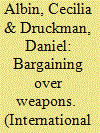

|
|
|
|
|
| Summary/Abstract |
This article explores the relationship between justice and effectiveness in bilateral and multilateral arms control negotiations. A set of hypotheses, derived from earlier research about the impacts of procedural and distributive justice on negotiation outcomes is evaluated. The sample consists of twenty cases, ten bilateral and ten multilateral. The results of statistical analyses show strong effects of procedural justice on the effectiveness of bilateral, but not multilateral, negotiations. Further analyses indicate that the effects are largely accounted for by half of the bilateral cases. Case-by-case analyses reveal some of the conditions that explain the correlation between pj principles and effective outcomes. Distributive justice correlated with more substantial agreements in the multilateral cases. Reasons for the limited effects of procedural justice on multilateral outcomes are discussed. The article concludes with more general implications and suggestions for further research.
|
|
|
|
|
|
|
|
|
|
|
|
|
|
|
|
| 2 |
ID:
155527
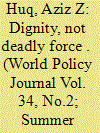

|
|
|
|
|
| Summary/Abstract |
While domestic security forces around the world equip themselves with military-grade weapons and surveillance technologies, those who research crime have reached a different consensus: To reduce lawbreaking, officers should listen to the accused, show basic courtesy, and exhibit evenhandedness. University of Chicago law professor Aziz Z. Huq concludes that the health of a country’s democracy may even depend on it.
|
|
|
|
|
|
|
|
|
|
|
|
|
|
|
|
| 3 |
ID:
113819
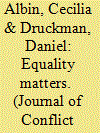

|
|
|
|
|
| Publication |
2012.
|
| Summary/Abstract |
This article explores relationships between procedural justice (PJ) in the negotiation process, distributive justice (DJ) in the terms of negotiated agreements, and their durability in cases of civil war. Adherence to PJ principles was found to correlate strongly with agreements based specifically on the DJ principle of equality. Agreements were also found to be more durable when based on equality, but not when based on other DJ principles. The equality principle accounted for the relationship between PJ and durability irrespective of differences between the parties in power. Further examination suggested that two types of equality in particular-equal treatment and equal shares-were associated with forward-looking agreements and high durability. The findings suggest that durability is served by including equality in the terms of agreements, and that PJ helps (but does not guarantee) achieving such agreements.
|
|
|
|
|
|
|
|
|
|
|
|
|
|
|
|
| 4 |
ID:
164155
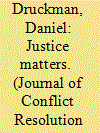

|
|
|
|
|
| Summary/Abstract |
Attaining durable peace (DP) after a civil war has proven to be a major challenge, as many negotiated agreements lapse into violence. How can negotiations to terminate civil wars be conducted and peace agreements formulated to contribute to lasting peace? This question is addressed in this study with a novel data set. Focusing on justice, we assess relationships between process (procedural justice [PJ]) and outcome (distributive justice [DJ]) justice on the one hand and stable agreements (SA) and DP on the other. Analyses of fifty peace agreements, which were reached from 1957 to 2008, showed a path from PJ to DJ to SA to DP: The justice variables were instrumental in enhancing both short- and long-term peace. These variables had a stronger impact on DP than a variety of contextual- and case-related factors. The empirical link between justice and peace has implications for the way that peace negotiations are structured.
|
|
|
|
|
|
|
|
|
|
|
|
|
|
|
|
| 5 |
ID:
165909
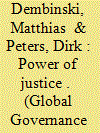

|
|
|
|
|
| Summary/Abstract |
Complaints about “double standards” in global governance are widespread. When governments from the Global South criticize powerful Western states for applying double standards in implementing norms such as international criminal justice, this is usually taken to indicate that they disagree with the substance of these norms. In contrast, this article argues that the criticism can also be understood as expressing dissatisfaction with the procedures for applying those norms. Based on insights from empirical justice research in social psychology, the article highlights the significance of procedural fairness for the legitimacy of institutions and illustrates the importance of concerns about procedural unfairness in recent complaints about the International Criminal Court (ICC) by African governments.
|
|
|
|
|
|
|
|
|
|
|
|
|
|
|
|
| 6 |
ID:
127296
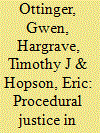

|
|
|
|
|
| Publication |
2014.
|
| Summary/Abstract |
Evidence suggests that state control of wind facility siting decisions fosters new project development more effectively than local control, yet the literature suggests that affected citizens tend to be more fairly represented in local siting processes. We argue that successful renewable energy policy must satisfy both the need for new project development and the obligation to procedural justice. To suggest how it can do so, we analyze existing state- and county-level siting processes in Washington state, finding that both fall short on measures of procedural justice. To overcome this limitation and address the tension between procedural justice and project development, we then propose a collaborative governance approach to wind facility siting, in which state governments retain ultimate authority over permitting decisions but encourage and support local-level deliberations as the primary means of making those decisions. Such an approach, we argue, would be more just, facilitate wind development by addressing community concerns constructively and result in better projects through the input of diverse stakeholders
|
|
|
|
|
|
|
|
|
|
|
|
|
|
|
|
| 7 |
ID:
113956


|
|
|
|
|
| Publication |
2012.
|
| Summary/Abstract |
How does the agenda management process influence the effectiveness of multilateral trade talks in the World Trade Organization (WTO)? How can the all-important agenda be shaped so as to enhance the prospects of an agreement being reached? How the agenda is managed directly affects the negotiation process which follows and the eventual outcome. Yet researchers have paid little attention to the particular dynamics and challenges of agenda management in large-scale multilateral negotiations, and actual practice points to several weaknesses. This article proposes that the complexity of the agenda in multilateral talks needs to be managed and reduced in procedurally just ways if a successful outcome (agreement) is to result. It develops an analytical framework of agenda management in multilateral negotiations and conducts a structured focused comparison to explain the differences in outcomes of two rounds of WTO negotiations: the failure of the 2003 Cancún Ministerial Conference and the success of the 2004 Geneva negotiations in reaching an agreement. The findings support the proposition that a successful outcome depends in part on reducing agenda complexity and that this needs to be achieved in procedurally acceptable (if not just) ways.
|
|
|
|
|
|
|
|
|
|
|
|
|
|
|
|